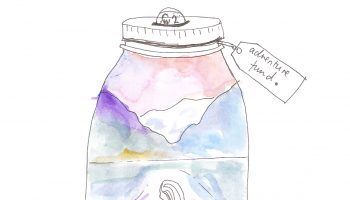Anyone who has recently taken first year literature would know Anna Poletti; a funny, authentic, and bright star radiating an energetic brilliance, not only into Monash’s literary department but into the contemporary literary scene at large. Ruby Kammoora was lucky enough to interview this much beloved lecturer before she jets off to her next academic adventure in Utrecht, Netherlands.
What differentiates good writing from exceptional writing?
I guess it depends on whether you are asking about intellectual writing or creative writing. There are things we say in the discipline that we generally agree upon; literature that is complex, evocative, and that can have more than one meaning. But good writing can also be interested in how language itself can shape – but also sometimes split open – active communication in really interesting ways.
When really good creative writers are at the peak of their powers, they seem to be creating works that strike you with their clarity, and thus seem very singular because of their sensibility, and the topic and way they are doing what they are doing. So they feel very particular, but then when you try and focus in on what makes it specific, it shatters into all these different pieces. And you think, actually, this could mean all kinds of things!
But I recognise that there is also a subjective element there. I don’t think everyone responds to great writing in the same way. And some people don’t get it. And they might not get it at that point in their life. So it is also a question of: is this the right time for someone to read this book? And I think that is one of the real challenges of teaching literature.
Why do you study literature?
The particular kind of literature I study is essentially nonfictional writing about lived experience. So life writing and zine culture was my PHD project. In particular, life writing in non-professional spaces, so youth life writing and self-published life writing.
I think people read these kinds of writing for very particular reasons, and they read them differently to the way they read fiction. There are things people feel that they can do with nonfictional writing about their lives that they can’t do in the novel or they don’t want to do in the novel. I think writing in this way explores the larger role that all literature has in the social and cultural dynamic of a given time and place in history. Literature is one of the key places where we can have a conversation about what it means to be a human, what matters to humans, what particular experiences of being human are like.
But I also like the way that theorists in the post-humanist tradition are also pushing back against that human-centred way of thinking about literature. So literature can also be about things that aren’t human. I am interested in that, and how that could disrupt some of the assumptions that we make about what culture does and what culture can teach us about.
Why do you study life writing?
So life writing outside of the book and outside the professional publishing industry is my thing. I’m interested in DIY cultural spaces, where people are making culture and making stories about their experiences that are not structured by the expectations that come with publishing, and that are free from the kinds of influence that editors can have over the decisions people make artistically around their work. I’m interested in the sociological questions that come from these areas, but a lot of DIY culture is studied in a sociological vein and I don’t find that satisfactory.
So, and I feel like I should say that something like “some of my best friends are sociologists,” often sociologists will read these texts as evidence of social trends and social experiences. Or for insight into, for example, ‘what it means to be a young person these days.’ But they’ll already have in their mind a set of ideas about what that is.
Where I feel that the ‘close reading’ literary studies approach is more open to letting the text (or group of texts) tell you what they are about, which produces a different perspective on why people might be writing in these spaces. So I guess my contribution to the study of DIY culture is to provide that more textual and narrative focus.
With such an interest in DIY spaces, how do you find working in an institution like Monash University?
Well I feel like I’ve been very lucky, in the sense that most people take what I do seriously – at least to my face. And I feel very lucky that doing a PHD on something as obscure as zines hasn’t gone against me. But if I am honest, I think like most people, I have a little bit of an ambivalent relationship with the institution. And women in academia are often plagued by imposter syndrome, where you spend most of your time waiting for someone to discover that you are not supposed to be there and tell you to leave. It is a very common experience, because of the history – you know, because of patriarchy.
But the flipside of that, is that I really enjoy being in a university. I really enjoy teaching. It is challenging and tiring. At least the way I do it, I feel like I have to be very present. I used to make theatre, and I feel like there is a little bit of the improvising attention required when you are teaching. You need to be reading how the room is working and listening to what people are saying to you but also listening to what they are trying to say to you. And I really enjoy that. I really enjoy working with students. It is not quite playing – it is too serious for playing – but being in the room with people and listening to their perspective on what we are doing and listening to them trying to nut out for themselves what that actually means… I find that intensely interesting, rewarding, and enjoyable.
Is there any advice you wish you were given as a budding scholar?
I think what I could have done, earlier than I did, was identify that people want to mentor you and want to be generous with their time. But you have to ask them for it. If you are asking questions that are directly related to what someone does or what they are good at, they love it if you want to pick their brain!


